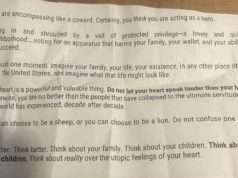“A good name is more desirable than great riches,” Governor Rick Perry said as he looked at the mother of Timothy Brian Cole, telling her that he was proud to “look you in the eye and tell you that I’m giving your son a pardon.”
Sadly, the pardon came too late for Cole. He died of an asthma attack in prison in 1999 at the age of 39 still under the stigma of having been convicted of a brutal rape and sentenced to 25 years in prison. By the time he died, he had been in prison 13 years, convicted of a horrendous crime that evidence would later show conclusively he did not commit.
But on March 19, at a packed press conference at Fort Worth’s Omni Hotel, Tim Cole’s family finally got what they have been seeking for more than two decades, his good name back.
Perry, surrounded by Cole’s mother, Ruby Session, his brothers, his large extended family, members of the Innocence Project of Texas — whose lawyers fought for years to prove Cole’s innocence — and local and state legislators, made public what the governor had formalized on March 1 in Austin: a full pardon for the Fort Worth native who was wrongly convicted by a Lubbock jury in 1986 of raping a young Texas Tech sophomore the year before. Cole maintained his innocence until he died.
Kudos for the governor’s action came from the family and a few legislators but there was at least one who saw the pardon as an attempt by Perry to take credit for something for which he had little to do.
“While this pardon is better late than never,” said Fort Worth state representative Lon Burnam, “it shows how justice was denied and hope deferred [for this family] for more than 20 years. …And we have a governor taking credit for it who has overseen more state-sponsored murders [the death sentence] than any governor in history. …How many of them were wrongfully convicted,” he asked.
Burnam also saw the pardon as a symbol of this state’s increasingly bleak record of sentencing innocent men and women to long prison terms and, he fears, even to death row.
To date, 40 Texas men have become members of a growing group known as “the exonerated,” former prisoners who, like Cole, were convicted of crimes they did not commit and later released from prison after DNA evidence proved their innocence. The findings of innocence came about after the cases were taken up by the Texas Innocence Project often working closely with law students from the Texas Wesleyan School of Law’s Innocence Project established several years ago by former Fort Worth attorney Mike Ware. Wesleyan law students were involved in the initial stages of the investigation that led to Cole’s exoneration.
In Dallas County alone, nineteen men have been freed since Dallas County district attorney Craig Watkins began working with the Innocence Project in an effort to right wrongful convictions in that county. Ware now heads that section of his office.
Charles Chatman is one of those exonerated. The Dallas resident was at the press conference. Chatman was released two years ago after spending 27 years in prison for a sexual assault that the Innocence Project proved he did not commit. But life has not been easy for him since his release, he said, because of an unbelievable breakdown in Texas judicial procedures. Even though Chatman has been fully cleared and pardoned, the conviction is still on his record and because of that, he cannot get a job. “I can’t even get a passport,” he said. His attorney has filed to have the record expunged, he said, “but the state hasn’t even replied.”
Based on Cole’s case and the numbers of innocents who have been released from state prisons to date, Burnam said there should be a moratorium now on any more executions in Texas until DNA evidence can prove beyond a doubt the guilt or innocence of the condemned. When the governor was asked by a reporter if he thought it was time for a moratorium on the death penalty based on concerns about the high number of wrongful convictions, he said no. “We have a justice system in place” that protects against wrongful death penalty convictions, he said, and a “lengthy appeals process” for further protection.
“I do not think the people of Texas will support a moratorium,” he said.
Even when the court finally cleared the way for Cole’s full exoneration after DNA evidence proved his innocence in 2008, it took two more years before Perry agreed to a full pardon, Burnam pointed out. The governor cited concerns that he did not have the power to grant a posthumous pardon. In January, after a ruling was called for months earlier from state senator Rodney Ellis of Houston, state attorney general Greg Abbot wrote to Ellis that a Texas governor does have such powers and cleared the way for the pardon that was finally signed by the governor in March.
Cole’s posthumous pardon is the first in Texas as well as in the nation. His family, who never gave up in their efforts to clear his name, is determined it will not be the last, his brother said, after thanking the Innocence Project for “believing in a man they never met.” The family said they will continue their fight by returning to the Texas legislature when it next convenes to lobby for a bill to be introduced that will impose more stringent conditions on eyewitness identification procedures. The bill will be named after Cole, said its sponsors, Senfreonia Thompson, a Houston state senator and Ruth Jones McClendon, a state representative also from Houston. Cole’s conviction rested solely on the eyewitness identification of one victim. No other evidence tied him to the attack.
The West Texas town was in a panic 25 years ago when Cole was arrested for raping Michele Mallin, the fifth rape victim in the city in four months, all young white women who were abducted near the university at knife point and driven to remote areas where they were brutally raped. The victims described their attacker as a tall, black man with curly hair.
The 25-year-old Cole was black and had curly hair. The Lubbock Avalanche-Journal, whose reporter Elliot Blackburn was given credit by Perry at the news conference for his aggressive coverage of the case that led to it being taken up by the Innocence Project and Cole’s ultimate exoneration, reported at the time that the only evidence against him was the victim’s eye-witness identification even though it was established by the defense that the rape occurred late at night in a dark, remote area by a black man who chain-smoked. Cole, an asthmatic, did not smoke.
He also had an alibi: friends and his brother testified that on the night of the rape, Cole was with them at the brother’s apartment where Cole lived while attending classes at Texas Tech. Prosecutors dismissed their accounts as lies designed to save Cole. Mallin remained insistent throughout the trial that she had identified the right man.
Then, DNA evidence, long buried in a Lubbock courthouse basement, combined with the 1995 jailhouse confession of Jerry Johnson whose DNA matched the rapist’s, finally proved Cole’s innocence. Johnson is serving a 99-year prison term for another crime; the statute of limitations had run out when he confessed, making it impossible to try him for the rape.
Mallin, who told the Lubbock daily of her horror at identifying the wrong man, joined the family’s quest to clear his name and allowed her name to be made public even though rape victims’ names are traditionally protected from disclosure by the press.
By then, of course, it was too late for the young man who was an Army veteran who had never been in trouble before and was described by family and friends as a good son who helped his mother raise his younger brothers.
“It has been 25 years since Tim was arrested,” his brother Cory Session told the gathering, and while it is too late for his brother to walk free, Session said, “There had to be a scapegoat, and Tim stepped up to the plate and fought the good fight for justice so that others could be set free. …We will continue that fight.”













